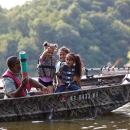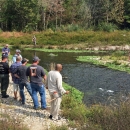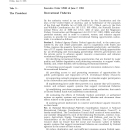What We Do
The Council advises the Secretary of the Interior and the Secretary of Commerce on aquatic conservation and restoration endeavors in fresh, estuarine, and marine environments that benefit recreational fishery resources, enhance recreational boating, and encourage partnerships among industry, the public, and government to advance these efforts.
The duties of the Council are solely advisory and include:
- Providing advice that will assist the Secretaries in compliance with the Fish and Wildlife Act of 1956, the Magnuson-Stevens Fishery Conservation and Management Act, and other applicable statutes;
- Fulfilling responsibilities established by Executive Order 12962, as modified by Executive Order 13474:
- Monitoring specific Federal activities affecting aquatic systems and the recreational fisheries they support, and
- Reviewing and evaluating the relation of Federal policies and activities to the status and conditions of recreational fishery resources;
- Providing advice that will assist the Secretaries in fulfilling responsibilities established by the Infrastructure Investment and Jobs Act of 2021, including, but not limited to:
- Studying the impact of derelict vessels and identifying recyclable solutions for recreational vessels, and
- Reviewing the study from the Comptroller General of the United States that documents the impacts of nonmotorized vessels on waterway access points and the use of funding sources to improve access issues and provide nonmotorized boating safety programs, and identifying potential recommendations for the Secretaries based on that study;
- Recommending policies or programs to increase public awareness and support for the Sport Fish Restoration and Boating Trust Fund;
- Recommending policies or programs that foster conservation, stewardship, and ethical practices in recreational fishing and boating;
- Recommending policies or programs to address climate change climate change
Climate change includes both global warming driven by human-induced emissions of greenhouse gases and the resulting large-scale shifts in weather patterns. Though there have been previous periods of climatic change, since the mid-20th century humans have had an unprecedented impact on Earth's climate system and caused change on a global scale.
Learn more about climate change and strengthen climate resilience by protecting and restoring aquatic ecosystems and supporting biodiversity while maintaining or enhancing fishing and boating opportunities; - Recommending policies or programs to stimulate and expand angler and boater participation in the conservation and restoration of aquatic resources;
- Recommending policies and programs to stimulate recreational fishing and boating opportunities for all Americans, and to remove barriers to access for youth, veterans, urban residents, and other underrepresented communities; and
- Advising how the Secretaries can foster communication, education, and coordination among government, industry, anglers, boaters, and the public.
Council members serve on subcommittees that focus on relevant topics, including boating issues, fishing issues, and outreach and communications. Learn more about each of the subcommittees.
Our Programs
The Sport Fishing and Boating Partnership Council is managed by the Fish and Aquatic Conservation program and receives funding through the Wildlife and Sport Fish Restoration Fund.
Our Services
The Sport Fish Restoration Program was authorized by the Federal Aid in Sport Fish Restoration Act (SFR), commonly referred to as the Dingell-Johnson (DJ) Act, passed on August 9, 1950.
The original Act provided for revenues from manufacturers’ excise taxes on sport fishing equipment to be deposited or transferred into a trust fund and apportioned to states, the District of Columbia and insular areas on a formula basis. The apportionments were then made available to the agencies with authority over fish and wildlife.
States and insular areas were required by the Act to have assent legislation which ensured revenue from license fees were used for the administration of the fish and wildlife agency.
The apportionment formula and assent legislation remain in the current SFR Act. However, as Congress amends the SFR Act and/or enacts other federal legislation, changes are made to the SFR Program.
Throughout the years changes have been made to the items taxable, tax rates, eligible projects, authorizations, distribution to SFR Program and other programs funded through the SFR Act.
See the Sport Fish Restoration Act Amendments for current distributions and a complete history on each amendment and how it impacted the Sport Fish Restoration Program as well as other programs funded through the Act.
The program regulation, 50 CFR 80, was revised 8/25/2008 to clarify procedures governing the annual certification of the number of paid hunting and fishing licensees, provisions for records retention, to update administrative requirements, and to delete references to forms no longer approved by the OMB.



